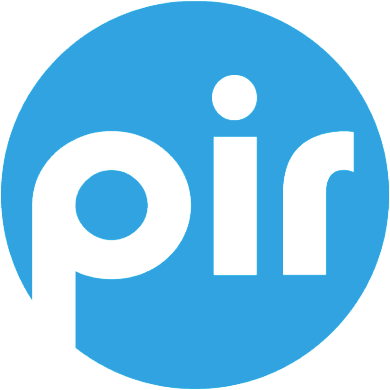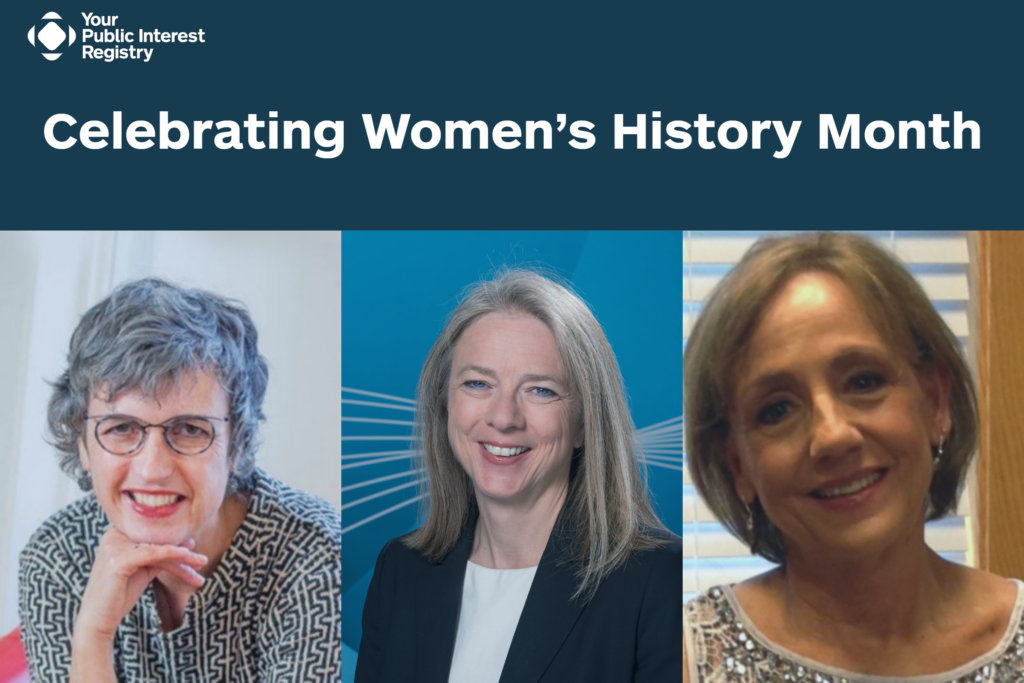Q&A with Public Interest Registry’s Tosca Bruno-van Vijfeijken, Melody Agee and Lise Fuhr
By Tony Connor, Marketing Operations Manager, Public Interest Registry
March not only represents the start of a new season, it also serves as the month we honor women’s contributions to history and contemporary society. To celebrate Women’s History Month, and International Women’s Day on March 8, Public Interest Registry spotlights three women who serve in leadership roles within our organization. In the Q&A below, these women share stories of how they got their start in the domain industry, provide their insight on industry leadership and reflect on their roles with Public Interest Registry.
We’ll be celebrating Women’s History Month throughout March, but strive to recognize the roles of our female team members at Public Interest Registry year-round. We hope you enjoy meeting Tosca, Melody and Lise!
Tosca Bruno-van Vijfeijken
PIR Roles: Board Secretary; Chair, Nomination Committee; Advisory Council Liaison
Q: How has the role of female leaders changed among international NGOs, civil society organizations, or even the organizations you work with?
A: In my niche of NGO consulting, I observe quite a few women in senior consulting roles and in the U.S. NGO sector, the number of women CEOs have increased steadily over the last 10 years. Interestingly enough, women CEOs, however, are still less represented in the largest U.S. NGOs. I have found that a majority staff at INGOs are women, but they do not fill senior leadership roles in proportionate ways. In fact, there is a campaign going on right now, #FairShare, which is focused on making women just as represented in the senior ranks of INGOs as they are among general staff.
Q: As a woman and with a background that is broader than the internet industry, can you provide insight on serving as a Public Interest Registry Board Member? Why is it important to you and what is your approach?
A: I come from the world of international development (as a former practitioner) and from the world of civil society (as a practitioner, analyst, observer and consultant). I was motivated to join the PIR board because I believe the internet is an incredibly important ‘infrastructure tool’ to help civil society and organizations in the space pursue their missions. Obviously, the .org and .ngo domains are important instruments in that regard based on their reputation for trust and being a safe and effective way to communicate. In my role with the board, and especially with Public Interest Registry’s ‘public interest’ mission, I take advocacy for the role of domains that represent civil society, seriously.
Q: What are some strategies that can help women break into and achieve more prominent roles within INGOs or CSOs?
A: For women to achieve more prominent roles they need to make better use of not only mentors but also sponsors – people who can advocate for their career growth, including behind the scenes, and point them to good opportunities. Regarding strategies that INGOs or CSOs can employ to retain high caliber women, they must emphasize the importance of family-friendly policies and be more diligent about pay equity.
Q: Can you tell us about your proudest Public Interest Registry moment or why your job is so rewarding?
A: I am, first of all, proud that Public Interest Registry contributes to the execution of the Internet Society’s (ISOC) mission – to make the internet as accessible as possible to all people in the world – by generating important revenues for ISOC’s programming. Second, many NGOs have poor education around cyber threats and data security. I view Public Interest Registry as an ‘unsung hero,’ because we prioritize advocacy and education to help keep the .org and .ngo domains safe from those dangers. Third, just by having the term ‘public interest’ in our name and mission, we are reminding other actors in the governance of the internet that its identity as a public asset must remain top of mind for all of us.
Melody Agee
PIR Role: Operations Manager
Q: How did you get into the domain industry?
A: The job found me! A friend of mine told me that Public Interest Registry was looking for someone to help with general office responsibilities. The position gave me a lot of flexibility to be available to my then school-aged children. I loved the small office vibe from the start and eventually found a home on the operations side of the house where I’ve remained for about 10 years.
Q: Are there more women in the industry today than when you started?
A: I think there are more women in all facets of industry period. When I was growing up it was more common for women not to work outside the home, let alone have a career. Then there was a period of time where women faced a new choice: could they balance motherhood with a career? Today, it’s understood that most women will have careers and significant others are stepping up to contribute to home and child-rearing demands. I’ve also noticed more companies offering incentives to help with a better work/life balance, which can help ease some of the guilt we tend to feel as working mothers.
Whether there is a financial need or if the work is volunteer-based, I think finding something that we are passionate about feeds our souls. It gives us purpose and keeps us engaged in the world.
Q: What do you do on an average day at/for Public Interest Registry?
A: I help make sure our registrars are contractually compliant, which helps ensure our own compliance with ICANN. A good part of my day is focused on customer relations, too. That can be broken down into two parts – do we sufficiently support our customers (both registrars and registrants) and do registrars have what they need to appropriately sell our products. We want everyone – registrars and registrants – to know how important they are to us.
Q: What are some strategies that can help women break into and achieve more prominent roles within the domain and/or internet industries?
A: My best advice if to find what you’re good at and capitalize on it! Do what you enjoy and care about, work hard and stay focused. Keep learning. Keep growing.
Q: Can you tell us about your proudest Public Interest Registry moment or why your job is so rewarding?
A: I do not have one moment, per se, but I am proud to be thought of as one of the trusted faces of Public Interest Registry. I love that registrars feel as though they can come to me with their concerns.
Q: If you could have dinner with a famous woman from any time period, whom would you choose and why?
A: I love stories about people who become unintended heroes. I would possibly choose Audrey Hepburn. She is still adored and valued for her volunteer work among people who were less fortunate than her. I also admire Henrietta Lacks. I’m just fascinated by this woman whose cancer cells are the source of the first immortalized cell line, one of the most important cell lines in medical research. Wouldn’t it be amazing to sit with her and explain all the good that was done in the medical field – and in the world – because of cells produced by her body.
Lise Fuhr
PIR Role: Chair and Director, Board of Directors
Q: How did you get into the domain industry? Are there more women in the industry today than when you started?
A: I got my start with the Danish registry DK Hostmaster as COO. I was with them for 7 years. When I left the registry to become Director General for ETNO (The European Telecommunications Network Operators’ Association) 3 years ago, I also joined the Public Interest Registry Board of Directors. I’ve always been interested in the interaction of technology and humans, and the societal changes this brings.
I believe it is important to have diversity in our industry and when I started 10 years ago there were many women in our industry serving as CEOs, CTOs, etc. Lately, I’ve seen a decline in the number of women in C-suite level positions, but I believe there are more coming into junior positions. I’ve also noticed that many women are interested in artificial intelligence and cyber security. I have high hopes that this interest area will bring more women to the domain name industry. With that, we are still lacking in female programmers, but I’ve also seen an increased drive to get young women interested in coding.
Q: What are some strategies that can help women break into and achieve more prominent roles within the domain and/or internet industries?
A: I believe that being a mentor and having female role models are important factors in getting more women onboard. As a female leader myself, I mentor young women to help them believe in their abilities and teach them how to grow as a leader. I also mentor young men and emphasize the importance diversity and inclusion.
Organizations should set up internal rules to maintain focus on inclusion – not only for women, but for all nationalities, sexual orientation, religions, etc. I believe that we should not have events without women, as a rule, as much as we should not have events about emerging economies without representatives of those countries being involved. Any strategy needs to be implemented at all levels of an organization and be part of the values that the organization has.
Q: Can you tell us about your proudest Public Interest Registry moment or why your job is so rewarding?
A: I find my work as a member of the Board of Directors rewarding because we work for a greater cause. Public Interest Registry is a trusted organization that works for a safe and open internet for all. The company supports the Internet Society and its mission to empower communities by connecting everyone and ensuring a safe and trusted internet. I enjoy that, through domain names, we get to help the internet grow for the benefit of citizens around the world.
Q: If you could have dinner with a famous woman from any time period, whom would you choose and why?
A: I would have dinner with Angela Merkel. She was a strong leader during a difficult time in European history and managed to have a strong focus on Europe taking a responsibility for certain issues such as the immigration crisis. Merkel believed in a united Europe and worked hard for it to remain united.
We encourage you to take this opportunity to learn more about, recognise, and share the stories of the women in your organization. You can also follow our Women’s History Month celebration on PIR’s Facebook, Instagram, Twitter and LinkedIn channels.

